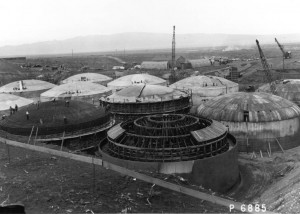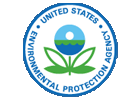The states of Oregon and Washington, having filed suit against the US Department of Energy in 2008, have negotiated a court-enforceable settlement agreement regarding continuing cleanup activities at Hanford nuclear reservation. Hanford is the most heavily contaminated facility in the western hemisphere with 53 million gallons of radioactive waste at 194 million Curies, the measure of radioactive potency.
The core of the settlement agreement focuses on languishing federal efforts to empty 140 remaining single shell storage tanks of radioactive sludge, and the severely delayed construction of the largest radioactive waste treatment facility in the US. Almost half of the single shell storage tanks are known to be leaking into the soil and to have infiltrated the groundwater in the Hanford plateau. This radioactive spill is moving toward the Columbia River and will reach the shoreline within 20-50 years according to current estimates. A seismic event could increase the speed of travel.
Radioactive waste from the deconstructed nuclear power plants along the shoreline is already leaching strontium into the river at levels 1500 times the drinking water standard. The city of Richland, WA, just downstream from Hanford, relies on surface water from the Columbia River for its potable water supply. This means the residents of Richland are already being exposed to harmful levels of radioactive waste.
The 3000 man construction crew for the new Hanford waste processing plant is only 50% of the way through the project. When complete, the vitrification facility (120’ tall and 1 ½ football fields in length) is supposed to convert the liquid sludge within the leaking tanks into glass logs for permanent storage. According to the settlement agreement, the facility is slated to begin operation by 2019, and be at maximum efficiency by 2022. It was supposed to be completed by 2011. The settlement agreement hinges on the assumption that the facility will begin operation on time, despite being 8 years behind schedule, design and construction failures, and $8 billion in budget overruns. According to the settlement agreement, once the vitrification plant is operational, Hanford is targeted to receive the “hottest” (Greater than Class C) radioactive waste from all around the US — the waste would be buried in landfills or boreholes, not processed into glass. The conciliation prize in the settlement agreement is a limited moratorium on shipments of nuclear waste to Hanford until the vitrification plant begins operation.
Only one other vitrification plant exists in the US, on the Savannah River. Aside from Hanford, there is only one other nuclear waste repository at the Nevada Test Site, however, that site has been closed by the State of Nevada. This leaves Hanford as the only identified nuclear waste site in the country.
Oregon and Washington filed suit against the US Dept. of Energy because the federal agency responsible for cleanup at Hanford violated cleanup deadlines in a contract called the Tri Party Agreement. Currently, the pace of cleanup of the leaking single shell tanks is 1-2 tanks per year, with the completion date to be 2018. Governor Gregoire describes the pace of only 1 to 2 tank abatements per year to be “absurd” and “unconscionable.” However, the state approved settlement agreement currently under public review accepts the pace of only 1½ tank abatements per year as a “realistic” goal. At this painfully slow rate, the radioactive groundwater plume caused by the leaking tanks will reach the Columbia River before the tanks are fully emptied. If the plume reaches the river, it will cause catastrophic proliferation of uncontainable nuclear waste. It is unlikely that the US Dept. of Energy will be able to create technology to abate radioactive waste from surface water. Burrowing rabbits on the Hanford reservation are already spreading radioactivity through their excrement.
Sadly, the proposed settlement agreement expands the deadline to clean out all the remaining 140 single shell storage tanks from 2018 to 2047. The state of Washington explains that the proposal is not “perfect”, but it will be enforceable through the courts. Various attendees from the public voiced opposition to this expanded timeline as recorded public comment.
The Washington State Attorney General’s office claims that it is better to enter into the new settlement agreement rather than risk losing the case in court with a starting court date of 2012. The Attorney General’s office describes the settlement agreement as a “good, defensible package, not ideal, but good,” and that negotiations required “tradeoffs.” Brett VandenHeuvel, Executive Director of Columbia Riverkeeper (also an attorney) disagrees with this assessment. VandenHeuvel pointed out that the preface to the settlement agreement reads “After the [public] comment period closes, the comments will be considered. After this consideration, and assuming there is no comment-based reason to reconsider finalizing the proposed agreements, a request will be made that the court enter the proposed Consent Decree.” VandenHeuvel wondered if the settlement agreement was a “done deal” and if the agencies will only ignore the public’s opposition to the new agreement.
Oddly, Washington and Oregon have approved the new settlement agreement before the public has even been allowed to review and comment upon the Environmental Impact Statement released just last week, and before studies and tests have been engaged on emerging new technology that could speed up the tank remediation process. If the settlement agreement is signed, the lawsuit against the US Dept. of Energy will be dismissed.
A press release dated August 11, 2009 from the US Dept. of Energy reads: “Energy Secretary Chu, EPA Administrator Lisa Jackson, Washington State Governor Gregoire, and Oregon Governor Kulongoski Join Elected Officials in Announcing Agreement on New Commitments for Hanford Cleanup Agreement also reached with State of Oregon.” Other listed supporters of this new settlement agreement include US Attorney General Eric Holder, US Senator Patty Murray (D-Washington), US Senator Maria Cantwell (D-Washington), US Representative Doc Hastings (R-Washington) and Washington Attorney General Rob McKenna.
Rosemere offered public comment that described the Hanford debacle as a battle between state’s rights and federal oversight, with the public being caught in the middle. Rosemere offered support for Columbia Riverkeeper, Hanford Watch, and Heart of America Northwest. Rosemere stated that the overwhelming mandate from Washington State voters to refuse additional nuclear waste at Hanford until the site is cleaned up has been willfully ignored by the agencies. The battle seems to stem over jurisdictional issues over management of the nation’s nuclear waste. According to a Ninth Circuit Court decision, such management is solely the jurisdiction of the federal government. Rosemere publicly asked the Attorney General to clarify if jurisdiction over nuclear waste was limited to processing and storage, or, if jurisdiction changes under state hazardous waste rules when nuclear waste migrates offsite in uncontrolled ways (such as the moving groundwater plume). Rosemere asked if jurisdiction changes when the public’s health and property are at risk because of a spill. Washington State does have authority to remedy hazardous waste, but not regulated nuclear waste. The Attorney General responded that it was a very good question, but one that has not been answered in the courts. The state appears to be afraid to try the case to get the answer to this important question. Rosemere contends that the state needs to pursue the lawsuit to obtain a ruling that decides this issue on behalf of the citizens of Washington.
Rosemere, along with Columbia Riverkeeper, Heart of America Northwest and other groups, all voiced opposition to the proposed settlement agreement and asked for the state to go back to negotiate a stronger contract with expedited, enforceable timelines, and a ban on additional nuclear waste being shipped to Hanford until the site is entirely cleaned up.
Rosemere requested that new double lined tanks to be built immediately so that the leaking tanks could be emptied faster to save the groundwater and the Columbia River. Rosemere also voiced skepticism that the US Dept. of Energy would even comply with the new deadlines in the proposed settlement agreement, and that an alternate plan needed to be developed should the vitrification plant fail to work. Rosemere stated that the agreement should include all Best Available Science and Technology to be applied to Hanford Cleanup rather than waiting for years to implement new ideas, for Best Management Practices to be employed during the cleanup, and for the federal government to be required to mitigate for all the time delays that contribute to extended groundwater degradation. Rosemere commented that Washington State had sold its citizens “up the river” with the weak settlement agreement and that Hanford was the state of Washington’s “shame.”
During prior public meetings, the US Dept. of Energy released plans to transform the location of the Hanford nuclear reactors, the site of continued migrating nuclear waste, into a national park site that would include camping. Rosemere voiced strong objection to this bizarre proposal.
On a brighter note, citizen actions were successful in preventing 80,000 truckloads of nuclear waste from being transferred to Hanford since it was selected as a national nuclear waste storage facility in 1999.
Rosemere urges everyone to submit public comment to oppose the proposed settlement agreement and to send the agencies back to negotiations for a better deal for Washington and Oregon, to better protect our water, our river, and our health.
Special thanks given to Gerry Pollet, Executive Director, Heart of American Northwest, for technical and historical information, and for tracking developments in the Hanford cleanup for the public.
The Public Comment Period for the Proposed Consent Decree and Tri-Party Agreement for Hanford Tank Waste Treatment (Settlement Agreement) is from October 1 to December 11, 2009. Documents can be reviewed online at http://www.ecy.wa.gov/programs/nwp/2008lawsuit_settlement.htm, or you may call the Hanford Cleanup Line for more information: 800-321-2008
Written comments may be submitted to:
Lori Gamache
Dept. of Energy
Office of River Protection
BOX 450, MSIN H6-60
Richland WA 99352
Fax 509-376-8142
Email: TPACH@rl.gov
Annette Carlson
Washington Dept. of Ecology
3100 Port of Benton Blvd
Richland WA 99354
Fax 509-372-7971
Email: Annette.Carlson@ecy.wa.gov












![Washington State Water Quality Assessment [303(d)] Washington State Department of Ecology](http://www.rosemerena.org/home/wp-content/uploads/2009/03/ecy_logo.gif)

